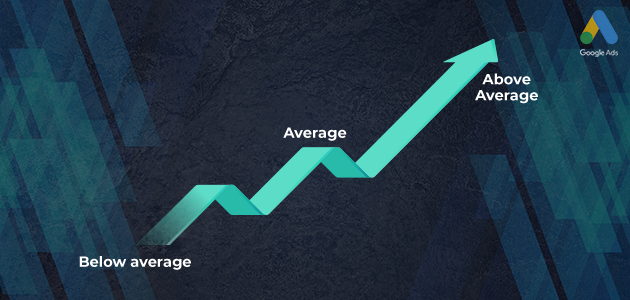How to Check And Improve Your Google Ads Quality Score

There are three sure ways to lose money these days. The first is investing in the Russian ruble, the second is to put all your savings on 34 red on a rigged roulette, and the third is to start a PPC campaign without carrying about your quality score. Yes, shockingly gaining leads from Google can't be done by simply throwing money as if it's an exotic dancer in a sleazy bar. Google needs a bit of romance first. And by romance, I mean the quality of the ad you want to promote.
I wouldn't be surprised if right now you are like, "Quality, you say. Yes, I've heard of this "quality" before." So let me share a bit more about Google Ads quality, why it is important, how to check it, and finally, how to improve it.
What Is A Google Ads Quality Score
Like any sane person who hasn't spent the last three decades pretending to be a duck in White Rock Lake, you probably have googled something. On a rare occasion, the first result, which most often is a Google Ad campaign by someone, is precisely what you were looking for. That's a quality campaign right in front of your eyes. This means that this PPC campaign has a high-quality score assigned by Google, and that's why it takes first place.
The Google Ads quality score is on a 1-10 scale, depending on the specific keyword you are targeting. For example, you can have an 8/10 score for one word and 3/10 for another (if you have more than one ad group). If you can't see these quality results from the very get-go, and instead you see a dash, don't panic, and don't throw away your laptop out of the window in a burst of anger. It takes some impressions and clicks for Google to finally notice you and assign you a score.
The quality score of your campaign is measured every time a new person clicks on it. To find out what quality score, you needn't sacrifice a lamb to get Google's good grace. Instead, simply head to the keywords report on your Google Ads account, and you can see it there for each keyword.
Why Should You Care About Google Ads Quality Score?
Despite the apparent reason - you want to attract people, who are actually interested in your product or service, there are some hidden benefits. Well, not so much hidden, as they are pretty obvious as well, but you don't think of them quite so much. For instance, the quality score is responsible for your Ad's ranking. This alone will significantly increase your click rate and lower your cost per click. As you already know from my SEO vs. PPC article, the PPC campaign is charged only when someone clicks on it, so you will ultimately get fewer visits. However, you will have a significantly higher conversion rate and astonishingly little cost per acquisition (CPA), and that's all that matters after all.
If you have a high score like 10/10 and you are still not in the top spot in Google, restrain yourself from taking out Larry Page's voodoo doll, you keep in your work drawer and keep calm. Yes, there is someone above you in the ranking, and the reason is, he is spending much more money. Shockingly giant corporations love the fresh smell of money in the morning, and whenever it comes to the Google rankings, money always beats quality. There is a well-known formula about who's going on top.
Bid+Quality Score = Ad Ranking
Don't overtrust your money, however, because they will help you if your ad is just a little less good than your competitors. If your quality score doesn't go over the minimum threshold, it won't even be published. After all, Google has a sentiment of its dominant position in the search engine market
By now, you are frantically wondering how to make your quality score 20 out of ten as fast as you can. But before we give you the answer, we should briefly discuss the factors behind Google Ad's quality score.
What Are The Factors Behind The Google Ads Quality Score?
Just like in the Bible, in the book of Google Ads quality score, there is a holy trinity that affects your PPC campaign's fate. If you fail to address them adequately, your results will suffer greatly.
First of all, as mentioned several million times so far, Google insists on relevance. So, naturally, your ads' content should actually relate to the keywords you are targeting. This, as mentioned above, will lead to lower CPC and a much higher conversion rate. So naturally, Google scores your quality based on how close you are to what you are claiming to be. This is done via crawlers, who scrape your content and determine how close your message is to the keywords and how often these keywords are mentioned inside. An above-average score means your ad group keyword matches your content. I guess it's pointless to point out what being below-average means, so I won't waste any time.
Google also puts great emphasis on the expected CTR (click-through rate). Your expected CTR is calculated by looking in a crystal ball and calling for the great spirit to give Google a vision. If only that were true... In fact, the calculation process is much more tedious. It's based predominantly on your previous ads. So the better your ads perform, the better the quality score will be in the future.
Finally, Google takes into account the Landing Page Experience (LPE). Here our technological overlord takes into account how the users react once they get on your page. Crucial stats here are the bounce rate and site speed. So if your website is not like a cheetah on steroids, you can take a look at our dedicated article {add link to article} and take care of this problem. Needless to say, if your bounce rate is high, or your landing page takes ages (which by today's standards is about 2,5 seconds) to load, your ad quality will be lower.
All of these factors have three levels of satisfaction - above average, average, and below average. I'll let you guess which one is good and which one is bad.
Types of Google Ads Quality Score
If it wasn't complicated enough, Google decided it would be hilarious to have several different types of quality scores. Yay, what fun. So, let's take a look at some of them:
- Account Quality Score - This score is basically your personality score, like the one they have in communist China. If you have a mistake, Google would know and punish you for it during your entire existence. Yes, it probably won't send you to a penal colony, but it would give your ads a lower score in the future. Here the main stats are related to your previous performances from all of your ads and keywords.
- Ad Group Quality Score - As you might have guessed, this is the quality score that Google gives each of your ads gropes. This is a secure way to see which exactly group is performing below average and correct it, so your overall score wouldn't suffer.
- Keyword Quality Score - This is the worst way to determine which keywords are relevant to your landing page. Actually, this quality score type shows if you've made a mistake. If you haven't done your research beforehand, there is not much hope for a successful campaign.
- Mobile Quality Score - The quality score is pretty much the same, regardless of the used device. Whether it's a PC, laptop, tablet, or smartphone, the quality score is a function of relevance, CTR, and experience. However, a new factor is taken into account when it comes to mobile devices - location. The closer the user is to the location of your business, the higher your score will be. For this, you need to have an actual physical store, though.
So knowing the factors and the types of quality, improving your quality score is not that hard of a job. All you need to do is improve your relevance, CTR, Landing page, and website speed, and you are good to go. Well, let's see how we can do it.
Improve The Relevance Of Your Campaign For Better Google Ads Quality Score
Before you get to improving your PPC campaign's quality, you should first bring some order to it. An adequately organized campaign is much easier to navigate, edit, and optimize. After all, a proper quality score boost needs a proper analysis which is impossible without seeing what you are looking for.
To bring order to the chaos, you don't need a chosen one, as most books would have you believe. All you need is to add a bit more ad groups into the mix and keep them tightly connected to the relevant keywords. So if you are selling healthy, vegan, gluten-free garlic-flavored chocolate bars, you'd need to have separate groups for the keywords that hail from the roots "healthy chocolate bar," "garlic-flavored chocolate bar," and so on. Inside each of these ad groups, you will put different word orders, synonyms, and other terms that relate to these specific keywords.
All of this will help you determine which keywords are of lousy quality, so you can sack them. In my example, I have the sneaking suspicion the low-quality keyword will be the "garlic-flavored chocolate bar," but we can't be sure before testing it.
Also, make sure you separate all your different target customers into different ad groups to see which keywords are relevant to them. Segmenting your target audience will allow you to have more narrowed-down data on their behavior and preferences.
Improve The CTR Of Your Campaign
Improving your CTR is probably the most demanding and creative part of the job. Your first task is to choose relevant keywords (duh) and snuff out the irrelevant ones once proven to be of lousy quality.
Also, don't be afraid to get creative with your Ad copy. Saying that, you should keep it relevant and don't promise pink elephants or to make wine out of water. That's how religions start, not how businesses grow. So instead of writing a new gospel, just include your best-performing keyword in your headline, description, and URL slug. Of course, you can also tattoo it on your biceps, but it won't matter all that much to your Google Ad's quality score.
The copy should sound natural. Remember that you are writing for people, not machines. Most importantly, be creative. Stand out from the crowd and avoid cliches.
To boost your CTR score, conversion rate and avoid unwanted clicks, you should consider adding some add-ons like a promotion extension or simply add your prices in the description and bold them, so people who are not interested won't go in just to bounce when they see the price.
This is not all, though. You should always exclude the negative keywords from the very get-go. This will protect your CTR from getting some adverse effects. Webmechanix has created a fantastic list of over 1500 negative keywords you should consider excluding. Despite adding them all to the exclusion list, you should keep a closer look at your keyword stats and exclude other keywords that negatively affect your CTR.
Finally, when all else fails, just remember the simple formula that determines your ranking position. Whenever something doesn't happen with fine-tuning, it happens with money. Just raise your bid and enjoy the first spot on Google.
Improve Landing Page
When it comes to your landing page, you must remember one simple thing. You are there to impress. So don't spare any effort in making your landing page genuinely magical. However, if your ad group’s targeted audience is looking for something different, don't be stubborn. Give them what they want and place the most relevant URL in the ad group. The user is not there to search. That's what Google is for, and you should have the information they are looking for. So point them to the most relevant page, not the most beautiful one. Just as a hint, your home page might be a piece of art, but it's not the right one for a PPC campaign. Or at least most of the time, it isn't.
Once you find out which is the most relevant page, make sure it is a page people would like to stay, spend time, or at least click that buy button.
You should also follow the bounce rate closely. Pages with a high bounce rate are perceived as not relevant enough by Google, which will bring your quality score down. A simple user journey would help you keep the bounce rate down and your conversion rate up. The fewer steps a user has to take before you liberate them from their money, the higher your conversion rate and the fuller your bank account will be.
If your content is brilliant, your copy unique, and your landing page as relevant as jokes about the failing Russian economy, yet you still don't get a high enough score, the problem must be in your website speed.
Improve Your Website Speed
As we've said countless times in our other articles, waiting more than 2 seconds for a web page to open has somehow turned into the 8th deadly sin. The fact is that people have money, but they don't have time, so if you want them to spend their money on your website, you better spare them time, even if it's a few seconds.
Low website speed will bring a higher bounce rate, lower CTR, lower landing page quality, higher CPC, much lower conversion rate, and most probably Ragnarok as well. So do yourself a favor, and before you even think of starting a PPC campaign, make sure your website speed is up to the task. You can learn how to improve your website speed and the immense benefits it will bring to both your PPC campaign and your SEO efforts in our dedicated article {add a link to the article}.
Increasing Your Quality Is Not An Easy Task.
Does all of the above sound like work for someone unfamiliar with all aspects of digital marketing? Of course not. Sure, you can always dedicate the time and learn the ins and outs of SEO and create the perfect PPC campaigns. It will only take a dozen or so months of sleepless nights and busy weekends as well as postponing your business goals by a few years, but you will spare a couple of hundred dollars in the process.
Or you can simply skip all the troubles and hire Locus Digital to do it for you. As one of the leading search engine optimization agencies in Dallas, we have the experience, tools, and know-how to create the perfect PPC campaign for you while you are focusing on the more important issues - like where to spend all the money our PPC campaigns will bring you.
Give us a call, and we will give you a free consultation on how we can improve your business and help it grow faster.


